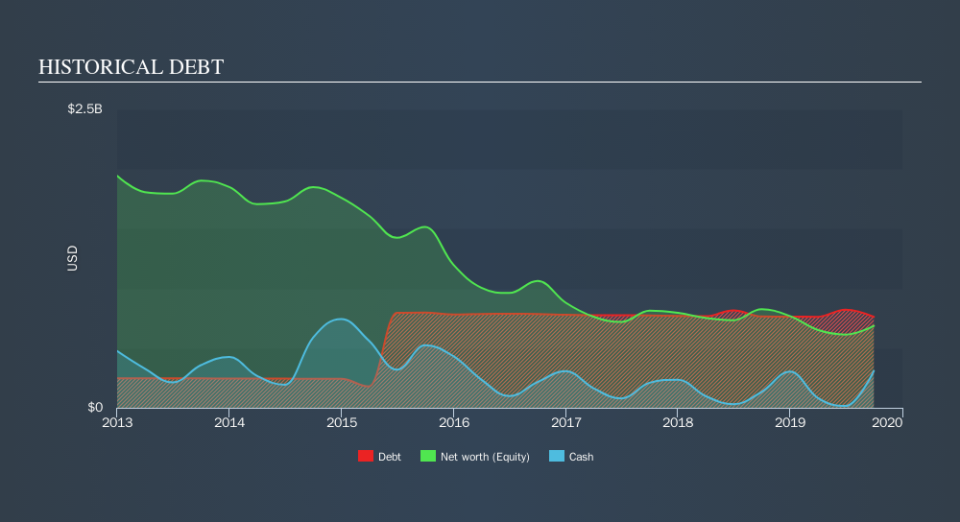Health Check: How Prudently Does Houghton Mifflin Harcourt (NASDAQ:HMHC) Use Debt?

Legendary fund manager Li Lu (who Charlie Munger backed) once said, 'The biggest investment risk is not the volatility of prices, but whether you will suffer a permanent loss of capital. It's only natural to consider a company's balance sheet when you examine how risky it is, since debt is often involved when a business collapses. Importantly, Houghton Mifflin Harcourt Company (NASDAQ:HMHC) does carry debt. But should shareholders be worried about its use of debt?
What Risk Does Debt Bring?
Generally speaking, debt only becomes a real problem when a company can't easily pay it off, either by raising capital or with its own cash flow. Part and parcel of capitalism is the process of 'creative destruction' where failed businesses are mercilessly liquidated by their bankers. However, a more frequent (but still costly) occurrence is where a company must issue shares at bargain-basement prices, permanently diluting shareholders, just to shore up its balance sheet. By replacing dilution, though, debt can be an extremely good tool for businesses that need capital to invest in growth at high rates of return. When we think about a company's use of debt, we first look at cash and debt together.
View our latest analysis for Houghton Mifflin Harcourt
What Is Houghton Mifflin Harcourt's Debt?
The chart below, which you can click on for greater detail, shows that Houghton Mifflin Harcourt had US$761.5m in debt in September 2019; about the same as the year before. However, it does have US$308.7m in cash offsetting this, leading to net debt of about US$452.8m.
How Healthy Is Houghton Mifflin Harcourt's Balance Sheet?
According to the last reported balance sheet, Houghton Mifflin Harcourt had liabilities of US$596.6m due within 12 months, and liabilities of US$1.54b due beyond 12 months. Offsetting these obligations, it had cash of US$308.7m as well as receivables valued at US$435.1m due within 12 months. So its liabilities outweigh the sum of its cash and (near-term) receivables by US$1.39b.
The deficiency here weighs heavily on the US$774.6m company itself, as if a child were struggling under the weight of an enormous back-pack full of books, his sports gear, and a trumpet." So we definitely think shareholders need to watch this one closely. At the end of the day, Houghton Mifflin Harcourt would probably need a major re-capitalization if its creditors were to demand repayment. When analysing debt levels, the balance sheet is the obvious place to start. But ultimately the future profitability of the business will decide if Houghton Mifflin Harcourt can strengthen its balance sheet over time. So if you want to see what the professionals think, you might find this free report on analyst profit forecasts to be interesting.
In the last year Houghton Mifflin Harcourt wasn't profitable at an EBIT level, but managed to grow its revenue by7.0%, to US$1.4b. That rate of growth is a bit slow for our taste, but it takes all types to make a world.
Caveat Emptor
Over the last twelve months Houghton Mifflin Harcourt produced an earnings before interest and tax (EBIT) loss. Its EBIT loss was a whopping US$121m. When we look at that alongside the significant liabilities, we're not particularly confident about the company. It would need to improve its operations quickly for us to be interested in it. For example, we would not want to see a repeat of last year's loss of US$175m. And until that time we think this is a risky stock. When I consider a company to be a bit risky, I think it is responsible to check out whether insiders have been reporting any share sales. Luckily, you can click here ito see our graphic depicting Houghton Mifflin Harcourt insider transactions.
If, after all that, you're more interested in a fast growing company with a rock-solid balance sheet, then check out our list of net cash growth stocks without delay.
We aim to bring you long-term focused research analysis driven by fundamental data. Note that our analysis may not factor in the latest price-sensitive company announcements or qualitative material.
If you spot an error that warrants correction, please contact the editor at editorial-team@simplywallst.com. This article by Simply Wall St is general in nature. It does not constitute a recommendation to buy or sell any stock, and does not take account of your objectives, or your financial situation. Simply Wall St has no position in the stocks mentioned. Thank you for reading.

 Yahoo Finance
Yahoo Finance 
